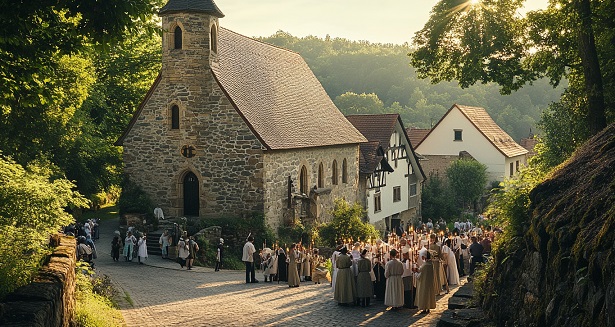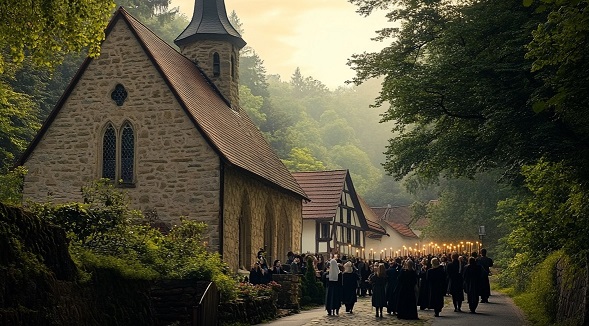
A Skyward Celebration: Why Ascension Day in Germany Matters
Each spring, exactly 40 days after Easter Sunday, Germany pauses for a holiday that blends the sacred with the social – Ascension Day. Known in German as Christi Himmelfahrt, this public holiday marks the biblical event of Jesus ascending into heaven, but it’s also much more than that. For many Germans, it’s a day to reconnect with both faith and family – or, alternatively, to hit the trails for hiking and hearty laughter with friends.
In this article, we’ll explore how Ascension Day is celebrated in Germany, uncover its historical and religious roots, and take a look at the unique cultural twist that makes this day a highlight of the German calendar. You’ll also find related links to help you dive deeper into German traditions, holidays, and Christian customs.
A Brief Overview of Ascension Day in Germany
Ascension Day is a Christian holiday observed on the 40th day after Easter, always falling on a Thursday. Its origins are firmly biblical, commemorating the moment when Jesus Christ ascended to heaven in the presence of his disciples (Acts 1:9-11). In Germany, it is both a public holiday and a church feast day, observed nationwide.
Unlike some other public holidays, Ascension Day remains steadfast in its dual identity: a solemn religious event and a joyful social gathering. Germany’s rich Protestant and Catholic traditions both observe the occasion, often with special church services, processions, and choral music.
But it doesn’t stop there – in Germany, Ascension Day has been humorously (and officially) co-opted as Father’s Day (Vatertag), transforming it into a day of male bonding, beer-laden hikes, and wheelbarrow parades. This curious combination is uniquely German and continues to attract both cultural interest and sociological commentary.
How Ascension Day is Celebrated in Germany

Church Services and Processions
Religious observance lies at the heart of Ascension Day. Across Germany, churches host special morning services, often held outdoors or even atop hills to symbolically mirror the event of Jesus rising to the heavens. In predominantly Catholic regions like Bavaria and Rhineland-Palatinate, traditional processions through the countryside are common, with clergy and congregants dressed in ceremonial robes.
In Protestant areas, particularly in Northern Germany, church services focus on community singing, biblical readings, and reflections on spiritual elevation. Many services incorporate nature, highlighting the idea of a spiritual journey and ascent.
Ascension Day as Father’s Day (Vatertag)
One of the most unusual – and thoroughly entertaining – aspects of Ascension Day in Germany is its overlap with Father’s Day. But don’t expect breakfast in bed or family brunches. German Father’s Day is an outdoor affair: groups of men (fathers or not) organize hiking trips or wagon-pulling excursions, complete with crates of beer and schnapps.
Known colloquially as Herrentag (Gentlemen’s Day), this tradition emerged in the late 19th century and became particularly popular in the former East Germany. It’s considered a day for men to bond, indulge, and take a light-hearted break from the routine. While some criticize the heavy drinking, others see it as a harmless cultural quirk that brings people together.
Public Holiday Atmosphere
Because Ascension Day always falls on a Thursday, many Germans take Brückentag (“bridge day”) off on Friday, creating a four-day weekend perfect for family outings, mini-vacations, and social events. Parks, hiking trails, and Biergartens are typically full. It’s also a popular date for weddings and community festivals, particularly in late-spring weather.
Shops, banks, and public offices remain closed, although tourist attractions and restaurants usually stay open. Visitors can expect busy roads and booked accommodations, especially in scenic rural areas.
Food Traditions and Regional Variations
While Ascension Day doesn’t have set dishes like Christmas or Easter, it is often accompanied by regional food traditions. In southern Germany, families might enjoy Weißwurst, pretzels, and beer in outdoor gatherings. In the north, smoked fish, fresh asparagus, and potato salad often make an appearance.
If you’re interested in traditional German dishes that might complement an Ascension Day outing, check out our German Salad Recipes – perfect for picnics and potlucks.
Examples, Fun Facts, and Traveler Tips
Fun Facts About Ascension Day
- Legal Holiday: Germany is one of the few countries where Ascension Day is a national public holiday, observed in all federal states.
- Weather Lottery: Traditionally, the weather on Ascension Day is believed to predict summer’s mood – sunny Ascension, sunny summer.
- Environmental Concern: Due to excessive littering and public drinking, some cities now impose restrictions or set up designated routes for Herrentag revelers.
Practical Tips for Travelers
- Book in Advance: Trains, hotels, and restaurants can fill up quickly over the Ascension weekend.
- Join a Hike: Many towns organize guided walks or local celebrations. It’s a great way to meet locals and experience authentic culture.
- Observe the Customs: If you’re near a church, consider attending a morning service. It offers deep insight into German religious life.
- Stay Safe: While Father’s Day is jovial, it can be rowdy. Keep an eye out for celebratory processions and keep your travel plans flexible.
A Day to Reflect, Rejoice, and Raise a Glass
Ascension Day in Germany is a remarkable example of how a nation can weave together the sacred and the secular, the historical and the humorous. Whether you’re drawn to its religious significance or intrigued by its beer-fueled Father’s Day antics, this holiday offers a window into the soul of German culture.
To dive deeper into Germany’s fascinating traditions, explore our guides on Easter in Germany, Public Holidays, or even Beer Culture in Germany for more on the liquid celebrations.







